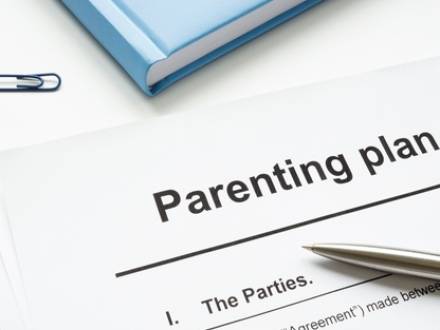Recent Blog Posts
When Can I File for Custody Modification in Illinois?
 When a child custody order is issued, the court understands that future changes in life circumstances may warrant its modification. The burden of proving the need for a change to the order falls on the parent who files, and judges generally have very high standards for what justifies a necessary change. If you need to file for a modification to your custody order, a DuPage County, IL family law attorney will listen to the details of your situation and help you decide on the next appropriate step.
When a child custody order is issued, the court understands that future changes in life circumstances may warrant its modification. The burden of proving the need for a change to the order falls on the parent who files, and judges generally have very high standards for what justifies a necessary change. If you need to file for a modification to your custody order, a DuPage County, IL family law attorney will listen to the details of your situation and help you decide on the next appropriate step.
What Are the Grounds for Custody Modification in Illinois?
What constitutes a valid claim for modifying a custody agreement can change on a case-by-case basis. However, some common and reasonable grounds for requesting an update include the following:
- Change in economic status: Financial stability plays a role in custody. Losing a job, experiencing a significant decrease in income, or taking on an unanticipated expense can qualify as a major life change.
When Does My Power of Attorney Go Into Effect?
 Aging adults are sometimes reluctant to execute powers of attorney, fearing that they could enable the agent to take control of their finances or place them in a nursing home over their objections. While it is reasonable and understandable to have these fears, knowing how powers of attorney work and when they go into effect will likely make you feel more comfortable creating these essential legal documents. Powers of attorney exist first and foremost to protect the person who creates them. There are different types of POAs you can use depending on whether you want your agent’s powers to go into effect immediately or not until you are incapacitated. An experienced Glen Ellyn, IL estate planning lawyer can help make sure you have the right incapacity planning documents prepared when you need them.
Aging adults are sometimes reluctant to execute powers of attorney, fearing that they could enable the agent to take control of their finances or place them in a nursing home over their objections. While it is reasonable and understandable to have these fears, knowing how powers of attorney work and when they go into effect will likely make you feel more comfortable creating these essential legal documents. Powers of attorney exist first and foremost to protect the person who creates them. There are different types of POAs you can use depending on whether you want your agent’s powers to go into effect immediately or not until you are incapacitated. An experienced Glen Ellyn, IL estate planning lawyer can help make sure you have the right incapacity planning documents prepared when you need them.
What Agreements Should a Parenting Plan Contain?
 Creating a parenting plan for your children can be emotionally trying. If you are working with your co-parent to establish a parenting plan by agreement, you will need to make compromises. Your parenting plan will need to address your parenting time schedule, first and foremost. You will need to determine when your child will spend time with each parent. You will also need to address your parental responsibilities in your parenting plan. In Illinois, the term "parental responsibilities" refers to parents’ duty to make important decisions about their children’s upbringing. Your parenting plan is your rule book for co-parenting. A well-crafted parenting plan can set you up for smooth and cooperative co-parenting. You should be represented by an experienced Glen Ellyn, IL child custody lawyer while you are creating your parenting plan.
Creating a parenting plan for your children can be emotionally trying. If you are working with your co-parent to establish a parenting plan by agreement, you will need to make compromises. Your parenting plan will need to address your parenting time schedule, first and foremost. You will need to determine when your child will spend time with each parent. You will also need to address your parental responsibilities in your parenting plan. In Illinois, the term "parental responsibilities" refers to parents’ duty to make important decisions about their children’s upbringing. Your parenting plan is your rule book for co-parenting. A well-crafted parenting plan can set you up for smooth and cooperative co-parenting. You should be represented by an experienced Glen Ellyn, IL child custody lawyer while you are creating your parenting plan.
Can I Use a Trust to Benefit Unborn Grandchildren?
 Grandparents often want to leave a gift directly to their grandchildren in their estate plans. Your gifts to your grandchildren are a part of your legacy. Giving what is called a class gift - a gift left to a particular group of people - allows you to divide money equally between your grandchildren. If you plan on leaving a gift for your grandchildren in your will or trust, you may want to consider the possibility that some of your grandchildren could be born after you have become incapacitated or after you have created an irrevocable trust. In these cases, you cannot change the language of your trust to individually include the new grandchild, even if your intended for all of your grandchildren to receive gifts from you. A knowledgeable Glen Ellyn, IL estate planning attorney can help you create trust that accounts for this situation.
Grandparents often want to leave a gift directly to their grandchildren in their estate plans. Your gifts to your grandchildren are a part of your legacy. Giving what is called a class gift - a gift left to a particular group of people - allows you to divide money equally between your grandchildren. If you plan on leaving a gift for your grandchildren in your will or trust, you may want to consider the possibility that some of your grandchildren could be born after you have become incapacitated or after you have created an irrevocable trust. In these cases, you cannot change the language of your trust to individually include the new grandchild, even if your intended for all of your grandchildren to receive gifts from you. A knowledgeable Glen Ellyn, IL estate planning attorney can help you create trust that accounts for this situation.
Potential Issues if You Buy a House Without a Lawyer
 When you are seeking to buy a house, you should be represented by a knowledgeable DuPage County, IL real estate lawyer. An attorney can do a lot to protect you during the transaction. Especially if it is your first time buying a home, the process can be confusing. A real estate transaction is nothing like buying a new furniture set or even a car. If you have been through a real estate closing before, you have seen the amount of paperwork involved. Without a real estate lawyer there to read through the language of every document you are asked to sign, you likely will not know what you are signing - even if you look over each contract yourself. These transactions are legally complex, and it is not always obvious what the wording of each document means. An attorney can make sure you are as secure and informed as possible.
When you are seeking to buy a house, you should be represented by a knowledgeable DuPage County, IL real estate lawyer. An attorney can do a lot to protect you during the transaction. Especially if it is your first time buying a home, the process can be confusing. A real estate transaction is nothing like buying a new furniture set or even a car. If you have been through a real estate closing before, you have seen the amount of paperwork involved. Without a real estate lawyer there to read through the language of every document you are asked to sign, you likely will not know what you are signing - even if you look over each contract yourself. These transactions are legally complex, and it is not always obvious what the wording of each document means. An attorney can make sure you are as secure and informed as possible.
What Can Go Wrong if I Do Not Have a Lawyer?
A lot can go wrong if you do not have an attorney review all your closing documents and represent your interests throughout the transaction. A few of the things that can go wrong when you are buying a house that a lawyer could likely prevent include:
Does Mediation Work in Contentious Divorce?
 Filing an uncontested divorce can save you and your spouse the hassle and expense of going to court. Uncontested divorce is also usually much faster than contested divorce because you will not need to wait for a court to act or spend time gathering evidence. While being amicable with your spouse can make negotiating a divorce agreement much easier, even spouses who have a very high-conflict relationship can use mediation or attorney-facilitated negotiation to achieve an uncontested divorce. Even if you and your spouse are planning to work with a mediator, you should also be represented by an experienced DuPage County, IL divorce lawyer.
Filing an uncontested divorce can save you and your spouse the hassle and expense of going to court. Uncontested divorce is also usually much faster than contested divorce because you will not need to wait for a court to act or spend time gathering evidence. While being amicable with your spouse can make negotiating a divorce agreement much easier, even spouses who have a very high-conflict relationship can use mediation or attorney-facilitated negotiation to achieve an uncontested divorce. Even if you and your spouse are planning to work with a mediator, you should also be represented by an experienced DuPage County, IL divorce lawyer.
Mediators Are Used to High-Conflict Divorce Cases
Divorce mediators are well-prepared to help spouses who are not on good terms. Most people who are getting divorced are not on good terms and are prone to arguing and rehashing the disputes that led to the divorce. A good mediator can help keep the conversation productive and focused when the parties begin to argue or get off-topic.
What Are the Pros and Cons of Short Sales?
 Owning a home can feel empowering. It can provide security, stability, and financial benefits. Sometimes, however, homeowners face significant challenges that make it a less profitable experience. Career changes, finances, the strength of the economy, and the terms of your mortgage can turn home ownership into an economic hardship.
Owning a home can feel empowering. It can provide security, stability, and financial benefits. Sometimes, however, homeowners face significant challenges that make it a less profitable experience. Career changes, finances, the strength of the economy, and the terms of your mortgage can turn home ownership into an economic hardship.
In such cases, a homeowner may choose to use an option called a short sale. A short sale is a type of solution for real estate owners who are experiencing financial distress, though it has significant advantages and drawbacks. This article will discuss what a short sale is, the pros and cons of short selling, and how to contact an experienced Illinois real estate attorney for more details.
What Is a Short Sale?
A short sale is when a homeowner sells real estate for less than what he or she owes on the mortgage. It is sometimes done to avoid foreclosure of the property by the bank. The homeowner uses the money from the short sale to cover some or most of the outstanding debt. For example: suppose you owe $650,000 on a mortgage and you sell the house for $550,000. Your outstanding debt, referred to as a deficiency, would be $100,000.
3 Considerations When Drafting Contracts in the Gig Economy
 As the gig economy continues to evolve, one of the key areas of focus for gig employers is contracts. Agreements between workers and companies should address the unique characteristics of the gig economy, such as:
As the gig economy continues to evolve, one of the key areas of focus for gig employers is contracts. Agreements between workers and companies should address the unique characteristics of the gig economy, such as:
- Flexible work schedules
- Project-based pay
- Independent contractor classification
Because gig businesses tend to hire more workers than conventional companies, there is often a more "conveyor-belt" approach to the hiring process. In some cases, this means the business does not establish a relationship with a worker as a company does with a full-time employee. It is crucial, therefore, for a gig company’s contracts to be strong and airtight so that it can be as protected as possible when hiring in bulk.
This article will discuss three important considerations when drafting contracts in the gig economy. The key to having a well-crafted employment contract is hiring an experienced Illinois contract lawyer.
Things to Know When Your Child Is an Online Influencer
 We live in an era where online content creation, personal branding, and influencers are part of the daily discourse. Anyone from an expert in a field to a child can have their own channels, with thousands and even millions of followers consuming their content. When influencers have sponsored posts, affiliate marketing, or subscriptions, they have the potential to earn serious money. What happens when your child wants to be an influencer and begins building an impressive following online? What begins as a fun hobby can become a lucrative business with legal oversight and obligations. This article will review a new law that dictates some requirements for parents or other guardians of child influencers. If this has become an issue for your family, speak with a knowledgeable DuPage County, IL business law attorney to understand how the law can impact you.
We live in an era where online content creation, personal branding, and influencers are part of the daily discourse. Anyone from an expert in a field to a child can have their own channels, with thousands and even millions of followers consuming their content. When influencers have sponsored posts, affiliate marketing, or subscriptions, they have the potential to earn serious money. What happens when your child wants to be an influencer and begins building an impressive following online? What begins as a fun hobby can become a lucrative business with legal oversight and obligations. This article will review a new law that dictates some requirements for parents or other guardians of child influencers. If this has become an issue for your family, speak with a knowledgeable DuPage County, IL business law attorney to understand how the law can impact you.
How Illinois Laws Can Impact Your Child
Most online platforms require users to be at least 13 years old, but many parents find ways to get around this. Often, parents can create a channel and simply post their child’s videos. If the child enjoys it and no one is harmed, it does not seem like much of an issue.
Questions about Homeschooling and Parenting Schedules in Illinois
 In recent years, families have increasingly chosen to educate their children through homeschooling. Since parents in the state of Illinois are not required to register to homeschool, it is difficult to know exactly how many children are taught at home rather than in schools but some estimates put the number in the tens of thousands.
In recent years, families have increasingly chosen to educate their children through homeschooling. Since parents in the state of Illinois are not required to register to homeschool, it is difficult to know exactly how many children are taught at home rather than in schools but some estimates put the number in the tens of thousands.
Homeschooling is an excellent solution for some children and an awful scenario for others. Additionally, some parents are very well-suited to teaching their children while others are not. It is no wonder that the decision to homeschool a child can be a very difficult one to make, particularly after a divorce. Often, parents who want to homeschool have very strong beliefs about large topics like education, social interactions, religion, and more. If divorced parents disagree about these larger topics, it is reasonable that they might disagree on whether or not homeschooling is the best choice for their child. What happens when the court has divided up your parental responsibilities, and you need to make this decision together? If you and your ex are having a hard time deciding where your child should go to school, speak with a qualified Wheaton, IL family law attorney to understand more.

















